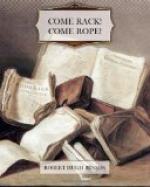“Come,” whispered Anthony again.
Robin stood up; he made as if to speak; then he silenced himself and began to walk to and fro in the little room. He could hear voices from the room beneath—Anthony’s men talking there no doubt. They might be his men, too, at the lifting of a finger—they and Dick. There were the horses waiting without; he heard the jingle of a bit as one tossed his head. Those were the horses that would go back to Dethick and Derby, and, may be, half over England.
He walked to and fro half a dozen times without speaking, and, if he had but guessed it, he might have been comforted to know that his manhood flowed in upon him, as a tide coming in over a flat beach. These instants added more years to him than as many months that had gone before. His boyhood was passing, since experience and conflict, whether it end in victory or defeat, give the years to a man far more than the passing of time. So in God’s sight Robin added many inches to the stature of his spirit in this little parlour of Froggatt.
Yet, though he conquered then, he did not know that he conquered. He still believed, as he turned at last and faced his friend, that his mind was yet to make up, and his whisper was harsh and broken.
“I do not know,” he whispered. “I must go home first.”
II
Dick was waiting by the porter’s lodge as the boy rode in, and walked up beside him with his brown hand on the horse’s shoulder. Robin could not say much, and, besides, his confidence must be tied.
“So you are going,” he said softly.
The man nodded.
“I met Mr. Babington.... You cannot do better, I think, than go to him.”
* * * * *
It was with a miserable heart that an hour or two later he came down to supper. His father was already at table, sitting grimly in his place; he made no sign of welcome or recognition as his son came in. During the meal itself this was of no great consequence, as silence was the custom; but the boy’s heart sank yet further as, still without a word to him, the squire rose from table at the end and went as usual through the parlour door. He hesitated a moment before following. Then he grasped his courage and went after.
All things were as usual there—the wine set out and the sweetmeats, and his father in his usual place, Yet still there was silence.
Robin began to meditate again, yet alert for a sign or a word. It was in this little room, he understood, that the dispute with Anthony had taken place a few hours before, and he looked round it, almost wondering that all seemed so peaceful. It was this room, too, that was associated with so much that was happy in his life—drawn-out hours after supper, when his father was in genial moods, or when company was there—company that would never come again—and laughter and gallant talk went round. There was the fire burning in the new stove—that which had so much excited him only a year or two ago, for it was then the first that he had ever seen: there was the table where he had written his little letter; there was “Christ carrying His Cross.”




